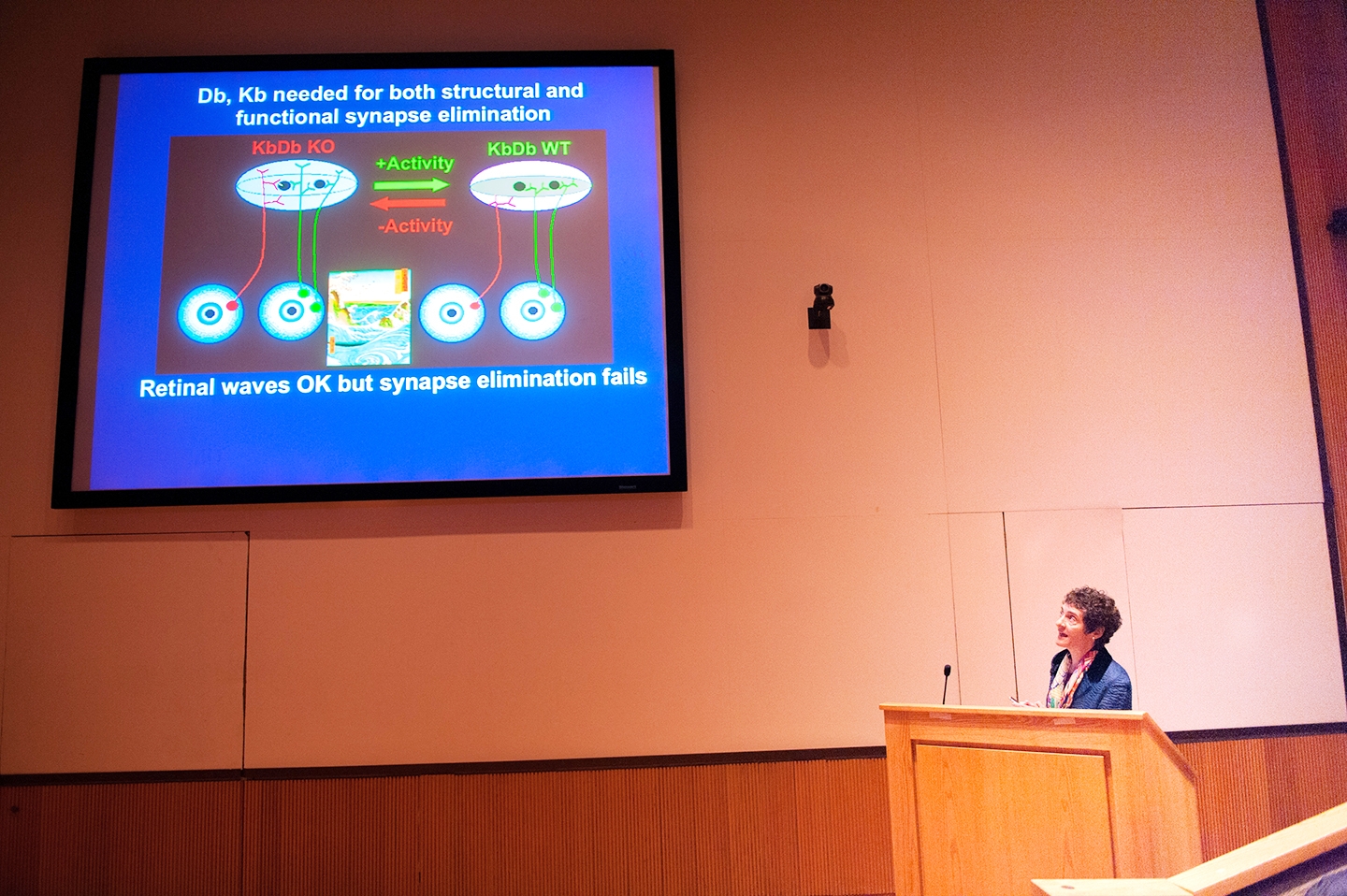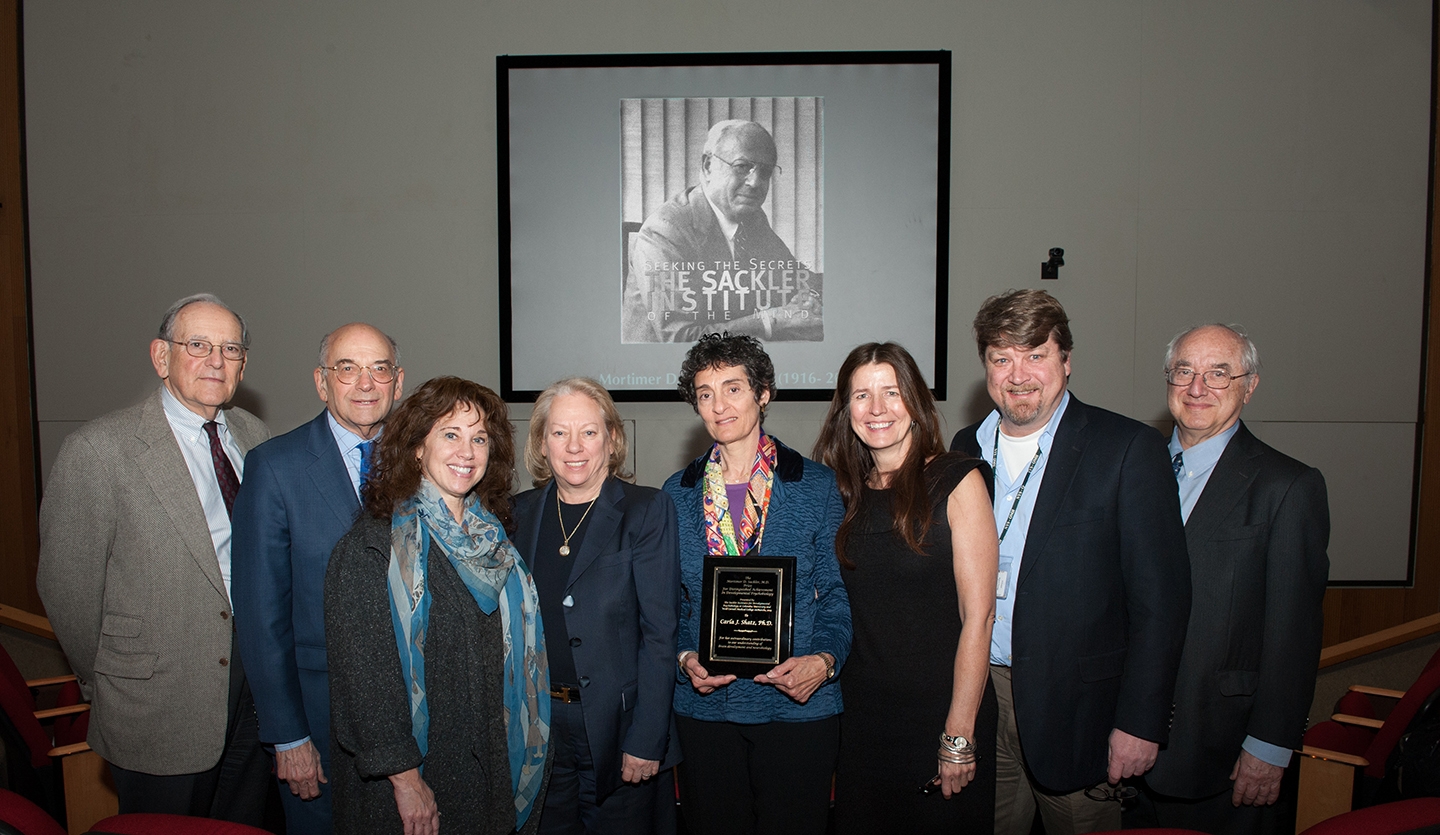Weill Cornell Medical College and Columbia University College of Physicians and Surgeons have awarded The Mortimer D. Sackler, M.D. Prize for Distinguished Achievement in Developmental Psychobiology to Dr. Carla Shatz of Stanford University for her pioneering achievements in neural development, particularly as it relates to the visual system.
Dr. Shatz's research has advanced understanding of fundamental principles of early brain development with the discovery that neuronal activity prior to birth is essential for later formation and refinement of connections in the visual system. This finding has important implications for understanding how the visual system refines its connections — work that has contributed to our understanding of critical periods of brain wiring that may be relevant in developmental disorders such as autism and schizophrenia.
Dr. Shatz is the Sapp Family Provostial Professor in Neurobiology and director of Bio-X, an interdisciplinary biosciences program at Stanford University that unites clinicians, biologists, engineers, physicists and computer scientists from across the university to help unlock the secrets of human health and disease. She spoke about her research and discoveries Feb. 27 at Weill Cornell and March 1 at Columbia University.

Dr. Carla Shatz
"I am incredibly honored to be chosen to speak here today and for this really lovely and much unexpected prize," Dr. Shatz said during her grand rounds lecture at Weill Cornell.
The Mortimer D. Sackler, M.D. Prize for Distinguished Achievement in Developmental Psychobiology recognizes researchers who have advanced our understanding of the developmental processes of mind, brain and behavior that contribute to normal development, and of the origins of mental illness. The prize aims to foster international cooperation among scientists and promote public understanding of their work.
It is presented jointly every two years by the Sackler Institutes for Developmental Psychobiology at Weill Cornell Medical College and Columbia University. The first prize was awarded in 2008 to Dr. Avshalom Caspi of King's College, London, and Duke University. Dr. Fernando Nottebohm of the Rockefeller University received the prize in 2010.
The prize, named in honor of Dr. Mortimer D. Sackler who died in 2010, was first given by his seven children in honor of Dr. Sackler's 90th birthday. Subsequently, the prize was endowed in 2009 by a gift from The Mortimer D. Sackler Foundation, Inc. Dr. Sackler was one of the most creative scientists in the field of developmental psychobiology, a term he coined. Dr. Sackler did pioneering work on the biological basis of mental illness.

Left to right: Dr. Theodore Shapiro, Dr. Jack Barchas, DR. Susan Shack Sackler, Dr. Kathe Sackler, Dr. Carla Shatz, Dr. BJ Casey, Dr. Jay Gingrich and Dr. Robert Michels
"I really don't think that there is a better recipient of this prize in terms of Dr. Sackler's commitment and vision for interdisciplinary sciences to bear on mental health and illness than Dr. Carla Shatz," said Dr. B.J. Casey, director of the Sackler Institute and the Sackler Professor of Developmental Psychobiology at Weill Cornell. "Dr. Shatz has been instrumental in bringing multiple disciplines together and has dedicated her scientific career to trying to understand the interaction of genes and environment on the developing brain and how that leads to our very being."
The committee that selected Dr. Shatz for the prize did so for her leadership in the field of neuroscience and her extensive track record of excellence in mentoring future scientists, in addition to her groundbreaking work, Dr. Casey said.
In 1976, Dr. Shatz was the first woman to earn a PhD in neurobiology at Harvard Medical School, where she studied with Nobel laureates David Hubel and Torsten Wiesel. In 1978, she joined the faculty at Stanford as assistant professor of neurobiology, where she was the first woman to receive tenure in the basic sciences.
Dr. Shatz is a member of the National Academy of Sciences, the American Academy of Arts and Sciences, the American Philosophical Society, and the Institute of Medicine and was recently elected as a Foreign Member of the Royal Society of London. She has been a Howard Hughes investigator and received numerous awards, including the Gill Prize in Neuroscience, the Society for Neuroscience's Salpeter Lifetime achievement award and the Ralph Gerard Prize in Neuroscience.

